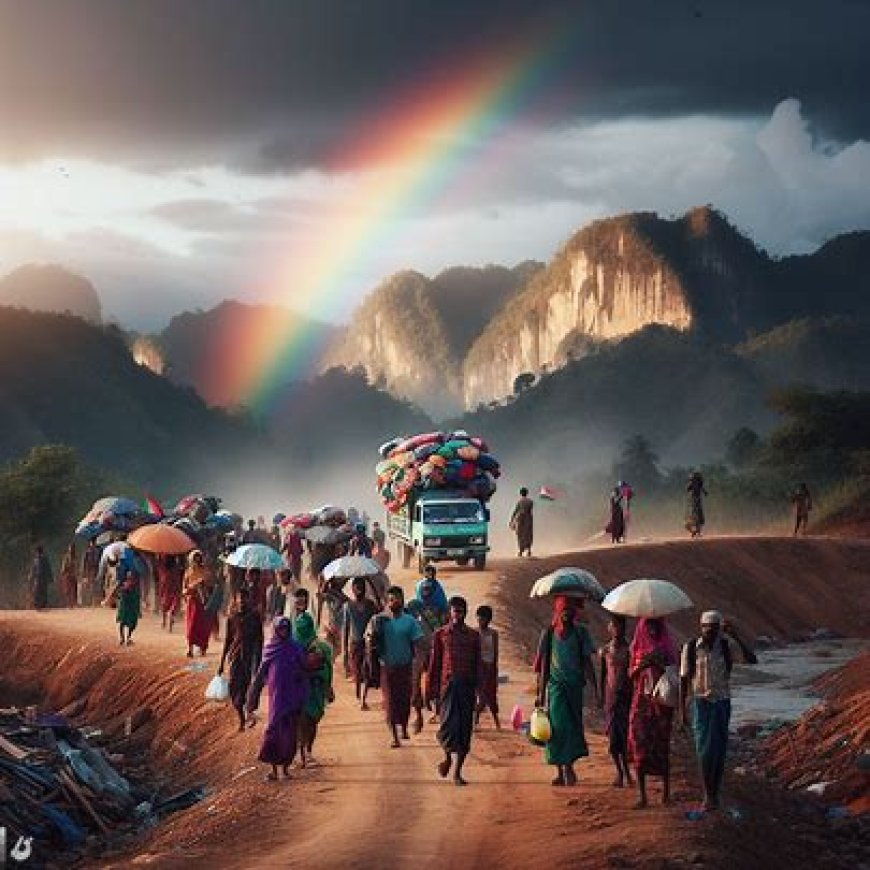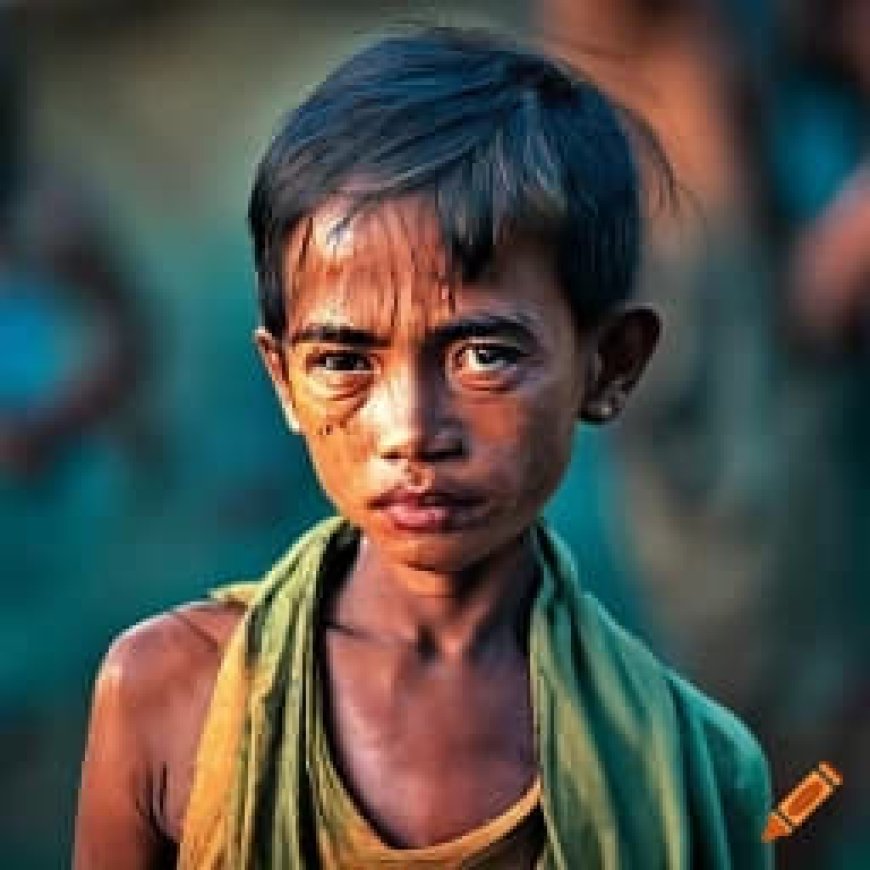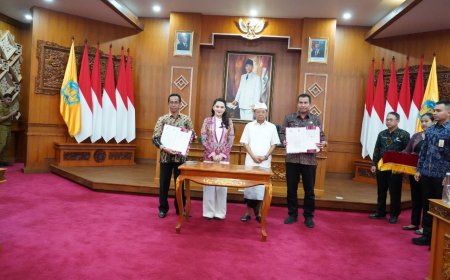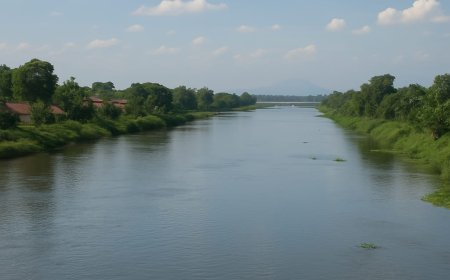Long Journey Home: Tragedy of Rohingya Displacement and Geopolitical Impacts
It's essential to note that the Rohingya refugee situation is complex and subject to change over time. This community faces various challenges, including legal uncertainty, difficult living conditions, and the risk of exploitation. The Rohingya refugee crisis has significant geopolitical implications at the regional and global levels.

The Rohingya refugees are a group of people belonging to the Rohingya ethnic minority, predominantly Muslim, and mostly residing in the Rakhine (or Arakan) region of Myanmar. They have experienced various forms of discrimination, oppression, and violence in Myanmar, compelling thousands to flee to neighboring countries in search of protection and a better life. Here are some key points related to Rohingya refugees:
1. Origin of the Crisis: The Rohingya refugee crisis stems from a long history of discrimination and inequality in Myanmar. Despite residing in the Rakhine region for centuries, the Myanmar government has considered them an unrecognized group, refusing to acknowledge their citizenship and enforcing discriminatory policies.
2. Atrocities Against Rohingya: Rohingya refugees fled a series of atrocities committed by the Myanmar military, including mass killings, rape, village burnings, and forced expulsion. These atrocities gained global attention and were deemed serious violations of human rights.
3. Refugee Camps in Bangladesh: The majority of Rohingya refugees seek protection in Bangladesh, particularly in the Cox's Bazar region. There, they reside in densely populated refugee camps, facing serious challenges related to living conditions, security, and access to basic services.
4. Difficult Living Conditions: Rohingya refugees in Bangladesh camps face difficult living conditions, including limited access to clean water, sanitation, education, and healthcare. These conditions create significant humanitarian challenges.
5. Limitations on Human Rights: Rohingya refugees encounter limitations on human rights, including citizenship rights, freedom of movement, and access to education. They are also vulnerable to exploitation and human trafficking.
6. International Response: The Rohingya refugee crisis has drawn attention and responses from the international community. Humanitarian organizations and UN agencies have actively sought to provide humanitarian assistance and raise awareness of the conditions faced by Rohingya refugees.
7. Uncertain Future: The future of Rohingya refugees remains highly uncertain. Despite efforts to resolve the crisis through diplomacy and international aid, the prospects for safe and sustainable repatriation to Myanmar remain a significant challenge.

Illustration of Rohingya Displacement (source: craiyon AI)
Rohingya refugees currently reside in various locations in several countries and regions in Asia. Some key locations include:
1. Bangladesh: The majority of Rohingya refugees are in refugee camps in Cox's Bazar, Bangladesh. This area has become a significant home for a substantial number of Rohingya refugees fleeing violence in Myanmar.
2. Myanmar (Burma): Despite the complex situation, some Rohingya communities still reside in their home country, Myanmar, though they often face discrimination and human rights restrictions.
3. Malaysia: Some Rohingya refugees have sought protection in Malaysia, although they may not have official refugee status and face the risk of arrest.
4. Indonesia: A number of Rohingya refugees have also sought asylum in Indonesia, especially in Aceh and other locations.
5. Thailand: Some Rohingya refugees may be in Thailand, often on their journey to their final destination.
It's essential to note that the Rohingya refugee situation is complex and subject to change over time. This community faces various challenges, including legal uncertainty, difficult living conditions, and the risk of exploitation.
The Rohingya refugee crisis has significant geopolitical implications at the regional and global levels. Here are some geopolitical implications of the Rohingya refugee crisis:
1. Regional Tensions: The Rohingya refugee crisis has led to tensions in the South Asian region, particularly between Bangladesh and Myanmar. Both countries have been engaged in debates regarding responsibility and crisis management.
2. Strain on Bilateral Relations: This crisis has strained relations between Bangladesh and Myanmar, leading to heated rhetoric exchanges and diplomatic tensions that could affect bilateral cooperation in economic and security domains.
3. International Organization Involvement: The international community, including the UN and humanitarian organizations, has actively engaged in addressing the Rohingya refugee crisis. This creates geopolitical dynamics where international pressure can play a role in urging involved countries to handle the crisis more effectively.
4. Regional and Global Influence: Responses to this crisis can influence the regional and global reputation and influence of the countries involved. Perceptions of a country's actions or inactions in addressing the crisis can shape the world's view of that nation.
5. Regional Instability: The Rohingya refugee crisis can create regional instability due to uncertainty about the fate of refugees and the potential for conflicts arising from disagreements and disputes among countries.
6. Formation of Alliances and Collaboration: The crisis provides opportunities for forming alliances and collaborations between countries and international organizations that share concerns about human rights and humanitarian crises. This can create new geopolitical dynamics at regional and global levels.
7. Influence of Extremism and Radicalism: The Rohingya refugee crisis may create an environment where extremist or radical groups attempt to exploit dissatisfaction and instability to recruit support. This can pose a threat to regional and global security.
8. Importance of Humanitarian Diplomacy: Responses to this crisis can shape the image of countries involved in terms of humanitarian diplomacy. Countries actively providing aid and playing a role in resolving the crisis can build a positive global image.
In this context, the Rohingya refugee crisis is not only a humanitarian issue but also has deep implications in the geopolitical realm that can affect inter-country relations and security dynamics in the region.
(source: chatgpt)
What's Your Reaction?

























































